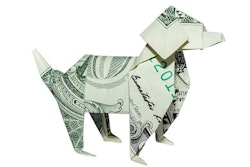
Pet care, including pet food, is one of the largest and fastest-growing e-commerce categories worldwide, outpacing total global online retail sales and growth, said Jodi Watson, industry consultant and vice chair of True Leaf Pet. For example, while overall e-commerce is rising by double digits each year, pet care e-commerce sales in the U.S. alone increased 67% in 2018.
Watson presented this and other data during Petfood Forum Europe 2019 on June 13 in Cologne, Germany. She also shared information and tips on why and how pet food companies should consider starting or expanding their own direct-to-consumer (DTC) e-commerce business.
Pet food e-commerce share larger than overall online share
E-commerce accounted for 12% of total global retail sales, or U.S.$1.9 trillion, in 2018, Watson said. That share is projected to reach 17.5% by 2021, according to Shopify. Projecting out to 2023, she provided data from Statista showing five-year e-commerce growth rates for various countries, ranging from 26% in Korea and Japan, up to nearly 71% in China. Countries such as the U.S., Australia, France and Russia are projected to experience 44% to 45% growth in that period, with the U.K. and Canada seeing 31% and 39% growth, respectively.
Comparatively, online pet food sales in the U.S. accounted for 17% of the market, according to Packaged Facts, and are expected to rise to 23% by 2023. During her presentation, Watson focused on Chewy.com and how its sales have increased to U.S.$3.5 billion, with auto-ship orders – often of pet food – comprising 66% of those sales. She also said that the online retailer’s sales from its existing customer base rose 120% year over year.
Consumers want and expect online access to products
Even with this type of success and projected growth, Watson acknowledged that some manufacturers worry that having their own DTC business could conflict with other channels they use to distribute their products. Whether “channel conflict” is real or perceived, Watson said that once manufacturers start selling directly to consumers, they report:
- Sales growth via all partners (reported by 54% of total product manufacturers, according to Forrester Research);
- Adopting a “preferred retailer” approach;
- Improved brand awareness, reported by more than 50%;
- DTC strategies helped them obtain early market feedback on their products before pitching them to retailers (14% reported this).
Further, multiple sources cited by Watson show 57% of all product manufacturers currently embrace DTC models, because consumers want and expect this. With 33% of consumers reporting e-commerce is the way they now prefer to buy and 52% saying they go online with an intent to buy, it only makes sense for companies to invest in the channel, Watson said. “This is not about supplanting or replacing a retailer or distributor for your products; it's about adding a channel and adding business.”
Watson referred to this strategy as being consumer-first, which brings benefits to brands such as insights into innovation (gaining a better understanding of your customers); being faster to market; protecting your business against retail downturns and also against Amazon; increasing your control over your brand, product, reputation and the user experience; giving you an omnichannel marketing engine; and driving sales.
How to start your own DTC platform
For pet food companies looking to start their own e-commerce platform, Watson offered tips:
- Don't start everywhere at once. Define a test (perhaps a geographical area) and that customer. Who is your customer vs. the consumer? Identify your audience and test a market or segment of it.
- Get your C-suite on board.
- Help your sales team sell it, and adjust their pay or otherwise incentivize them.
- Define channels.
- Hire/build your DTC team. Get people with digital experience but also with selling one thing well (vs. entire pallets at a time).
- Determine gaps in your tech stack, customer service and fulfillment. This will help you know where to first hire.
Petfood Forum Europe 2019 drew 250 pet food professionals from throughout Europe and the world to hear the latest research and expert insights on brand loyalty, direct-to-consumer business, social media, sustainability in pet food and novel and encapsulated ingredients. It was held in conjunction with Victam International 2019.

















